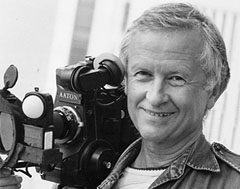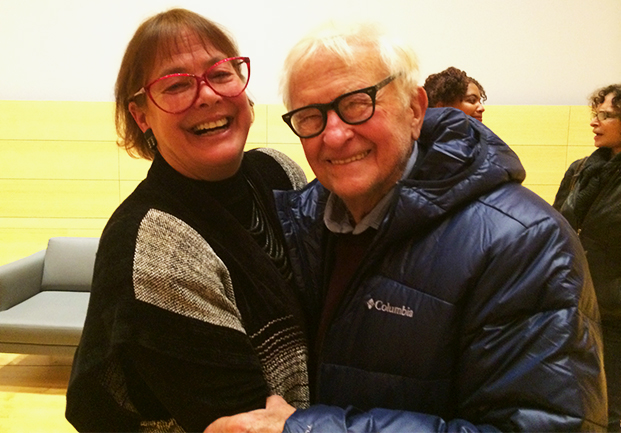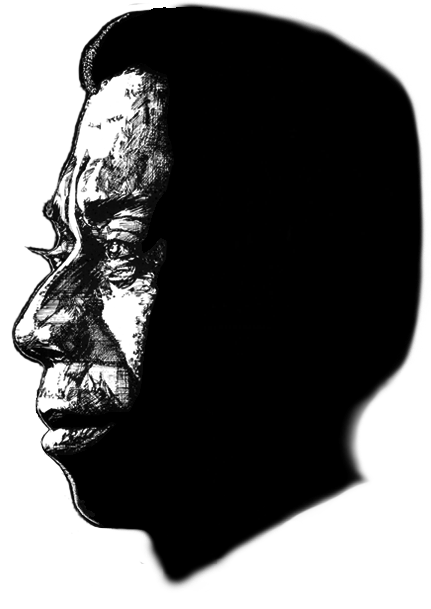- “As a documentarian, I happily place my fate and faith in reality. It is my caretaker, the provider of subjects, themes, experiences – all endowed with the power of truth and the romance of discovery. And the closer I adhere to reality the more honest and authentic my tales. After all, the knowledge of the real world is exactly what we need to better understand and therefore possibly to love one another. It’s my way of making the world a better place.”
- Two of America's foremost non-fiction filmmakers, Albert Maysles and his brother David (1932-1987) are recognized as pioneers of "direct cinema," the distinctly American version of French "cinéma verité." They earned their distinguished reputations by being the first to make non-fiction feature films -- films in which the drama of human life unfolds as is, without scripts, sets, or narration.
- Born in Boston of Jewish immigrants from Eastern Europe, Albert received his B.A. at Syracuse and his M.A. at Boston University where he taught Psychology for three years. He made the transition from Psychology to film in the summer of 1955 by taking a 16mm camera to Russia to film patients at several mental hospitals. The result, Psychiatry in Russia, was Albert’s first foray into filmmaking. Several years later, the Maysles brothers made a motorcycle journey from Munich to Moscow and along the way shot their first collaborative film on the Polish student revolution.
- In 1960, Albert was co-filmmaker of Primary, a film about the Democratic primary election campaigns of Kennedy and Humphrey. The use of hand-held cameras and synchronous sound allowed the story to tell itself. With their fine-tuned sense of the scene-behind-the-scene, the Maysles brothers made Meet Marlon Brando (1965) and With Love From Truman (1966). Then they came out with the landmark non-fiction feature film Salesman (1968), a portrait of four door-to-door Bible salesmen from Boston. It won an award from the National Society of Film Critics and is regarded as the classic American documentary. In 1992, the Library of Congress saluted the film for its historical, cultural and aesthetic significance.
- Albert was made a Guggenheim Fellow in 1965. His next three films became cult classics. Salesman (1968), Gimme Shelter (1970) is the dazzling portrait of Mick Jagger and the Rolling Stones on their American tour, which culminated in a killing at the notorious concert at Altamont. Grey Gardens (1976) captures on film the haunting relationship of the Beales, a mother and daughter living secluded in a decaying East Hampton mansion. These films were released theatrically to great acclaim.
JAMES BALDWIN TRANSMEDIA PROJECT
Albert Maysles, 1926 - 2015
Executive Producer

- Maysles Films Inc. has produced many films on art and artists, including a long-standing collaboration of celebrated artists Christo and Jeanne-Claude, whose monumental environmental projects were documented in Academy Award-nominated Christo's Valley Curtain (1974), Running Fence (1978), Islands (1986), Christo in Paris (1990), Umbrellas (1995), which won the Grand Prize and People's Choice Award at the Montreal Festival of Films on Art, and The Gates (2005).
- Albert's forays into the world of music range from What's Happening! The Beatles in the USA (1964) and Gimme Shelter to films on Leonard Bernstein, Seiji Ozawa, Vladimir Horowitz, Mstislav Rostropovich and Wynton Marsalis, several of which have received Emmy Awards. In 1994, Albert re-united with the Rolling Stones to filmed an up-to-date portrait, Conversations with the Rolling Stones which was broadcast on VH-1.
- Albert worked with Susan Froemke and Deborah Dickson on Abortion: Desperate Choices, which examined one of the most controversial topics in America (broadcast on HBO in 1993). In 1996, Letting Go: A Hospice Journey (broadcast that year on HBO) told the stories of three terminally ill patients and their experiences with hospice care. Albert collaborated with Susan Froemke and Bob Eisenhardt on Concert of the Wills: Making the Getty Center (1997). Shot over twelve years, the film chronicles the development of the Los Angeles Center from concept through construction. In 2001, Albert joined with Froemke and Dickson again for an HBO commissioned project, Lalee's Kin: The Legacy of Cotton, a story of one family's struggle to break free from the cycles of poverty and illiteracy in the Mississippi Delta.
- In 1994, the International Documentary Association presented Albert with their Career Achievement Award. He has received S.M.P.T.E.’s 1997 John Grierson Award for Documentary, the American Society of Cinematographers’ 1998 President’s Award (given for the first time to a documentarian), the Boston Film and Video Foundation’s 1998 Vision Award, Toronto's Hot Docs 1999 Lifetime Achievement Award, the 1999 Flaherty Award and the Thessaloniki 2001 Lifetime Achievement Award. In 1999 Eastman Kodak saluted Albert as one of the 100 world's finest cinematographers.
- In 2001 Albert received the Sundance Film Festival 2001 Cinematography Award for Documentaries for Lalee's Kin: The Legacy of Cotton. In 2001 Lalee's Kin was nominated for an Academy Award, and in 2004 the film received the DuPont Columbia Gold Baton Award.
- Albert received exclusive access to the Dalai Lama and filmed his visit to New York in the summer of 2003. In 2007, with Antonio Ferrera, he released The Gates, about Christo and Jeanne-Claude's art project: 7500 gateways gracing the walkways of Central Park, New York City for 16 days of beauty and celebration.
- Most recently he revisited both The Rolling Stones and Paul McCartney with the films, “Get Yer Ya-Ya’s Out,” (2009) a chronicle of The Rolling Stones’ epic performance at Madison Square Garden in November 1969, and The Love We Make, a 2011 film following Paul McCartney through the streets of New York City in the immediate aftermath of the 9/11 attacks as he organized an all-star benefit concert, The Concert for New York City.
- In July of 2014, Albert received the prestigious National Medal of Art award from President Obama.
- His most recent documentary, “Iris” (2014), about the fashionable interior decorator Iris Apfel, was shown at the New York Film Festival in October. And the Tribeca Film Festival recently announced it would screen the world premiere of “In Transit,” a film he directed with Nelson Walker, Lynn True, David Usui and Ben Wu, exploring the long-distance train route the Empire Builder.
- Vist the Maysles Documentary Center website, for In Memoriam photos and articles, press releases and more information. Albert passed away at home on Thursday, March 5, 2015.
- Director Karen Thorsen and Executive Producer Albert Maysles at the NYC Premiere of our digitally restored film, at The New School on November 12, 2014. Albert pronounced the film a "masterpiece" and reiterated his belief in the continuing importance and relevance of this project.

. . . . . . .

